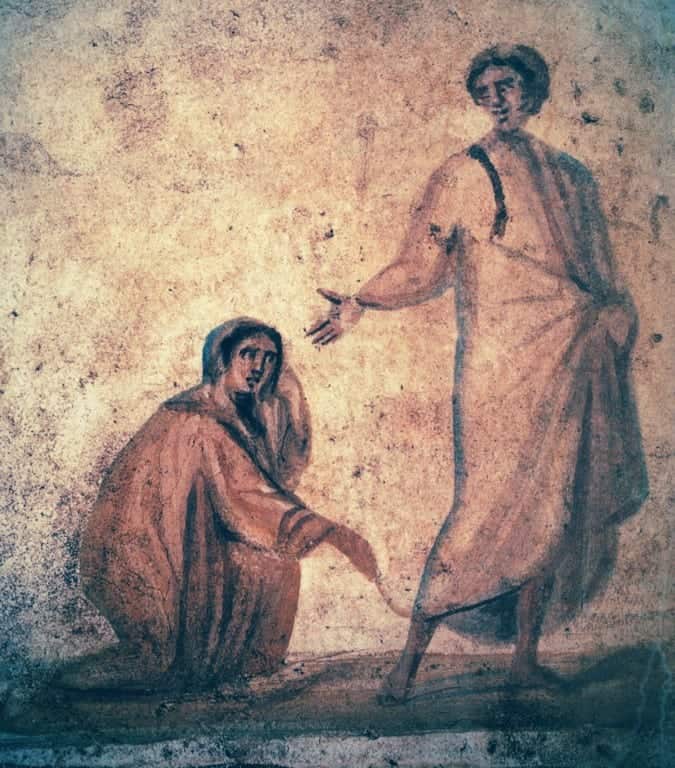Sunday, 30th June: Wisdom 1:13-15, 2:23-24, 2 Corinthians 8:7-end and Mark 5:21-end
God does not delight in the death of the living.
Bold and hopeful words from the Book of Wisdom: God creates that living things might exist.
The created order is drawn into this pattern of generativity - of creativity - that is wholesome: good, healthy, virtuous, fruitful.
Part of what it is to me made in the image and likeness of God is to carry within us this light of hope; this desire of wholeness; the longing of immortality.
Such gifts given freely in love - an act of divine creativity without compulsion.
Envy crept into the world: a fear of scarcity and lack; selfishness shaping our desires; what we want rather than what others need.
In the world as we know it, our hearts can be turned inwards towards, away from others and God. And yet, we know that the first impulse of light and love is there.
In commandments shaping and guiding our loves: to honour and bless, to seek what is just and merciful, beautiful and true.
When hearts turned away from commandments, prophets called us back, helping us reimagine a more whole and wholesome future.
When hearts turned away from love, God’s word dwelt among us: loving us in flesh of our flesh.
In today’s gospel reading, Jesus is radiating this love in ways which raise up and restore; bringing healing and wholeness; taking the sting of death and restoring life.
We know what it's like to be in the midst of a crowd: at stations and festivals, in stadiums and marches, watching the Euros or dancing at the Eras tour.
Today Jesus encounters two children of God: two daughters - one who’d been suffering for as long as the other had been alive; one facing death barely as life had begun.
Twelve long and yet fleeting years.
The father of the young girl is a person of power and influence, he falls at Jesus’ feet, laying all his authority and anxiety before him. He pleads for health and life.
The older woman has no such public status. She is marginalised and invisible - crouching near the ground, she creeps along amidst the moving feet of the crowd.
Like many perimenopausal women, she’d sought out medical advice to no avail; she’d spent her money on possible cures and treatments, yet the symptoms and bleeding would not stop.
She had heard of Jesus: a healer, a teacher; a story-teller.
Amidst the robes, sandals and dust she reached out and touched the hem of his garment. The smallest gesture, a fragment of fabric.
Then she felt the moment that her flow of blood stopped.
He too felt it. Felt the flow of power from him towards another.
That moment of intense and intentional longing was not just another body in the crowd. He sees her. He raises her up.
Her healing is holistic: she is made whole and restored to social life and belonging; she is able to tell the whole truth of her life, her body, her shame, her hope. She becomes a witness to that movement of God’s love in him; he praises her faith.
Perhaps now she can take - or retake - her place community. Healing does not restore to her youthfulness and fertility; but it does restore her to that place of wise elder; to a life that is generative in the care and support she gives to others, to the memories of faith she carries.
How must Jairus have felt as he watched this moment of disruption, or interruption? Watching not as the man of authority but as the anxious parent.
How must he have felt when the news reached him that the journey was now in vain; hope of healing lost to him. He need not trouble this teacher.
Jesus though invites him to move from fear to trust. He invites him to step aside from the competition and wailing, from the crowds and mocking laughter.
In him is made real the words of Wisdom: God does not delight in the death of the living. She is not dead, he says, but asleep.
That same power that flowed to stem a flow of love now flows to restore the breath of life. Talitha cum.
He takes her hand. He invites her to get up. She stands and walks.
Jesus is the one who brings the radiating energy of life and love; who moves fear to faith; who builds trust and restores hope. This healing is an invitation into the wholesome life of generativity.
Such generativity - such a life giving move - is directed to the needs of others. For Paul, as he proclaims the good news of Jesus who brings life out of death, who breaks the bonds of the grave, this means attending to those in need, on the margins.
For him the grace of God brings unity, a reconciling love. A love that extends across difference and disagreement in practical support. In his case across Jewish and Gentile communities.
The wholesome death-defying life that he commends is about generosity in the face of affliction. The only competition is an eagerness to give - abundance and need are in a reciprocal relationship: no one having too little or too much.
We too should be eager to share in this overflow of life.
© Julie Gittoes 2024
